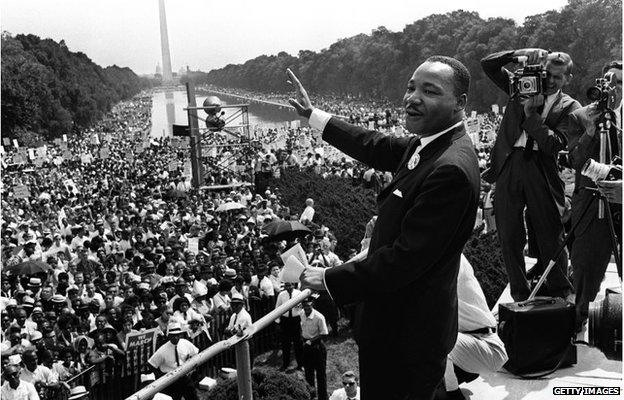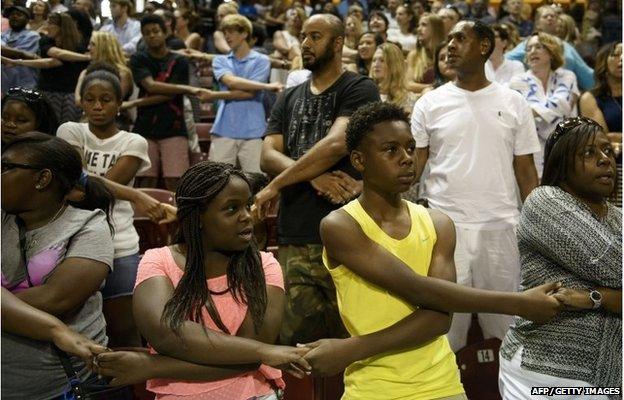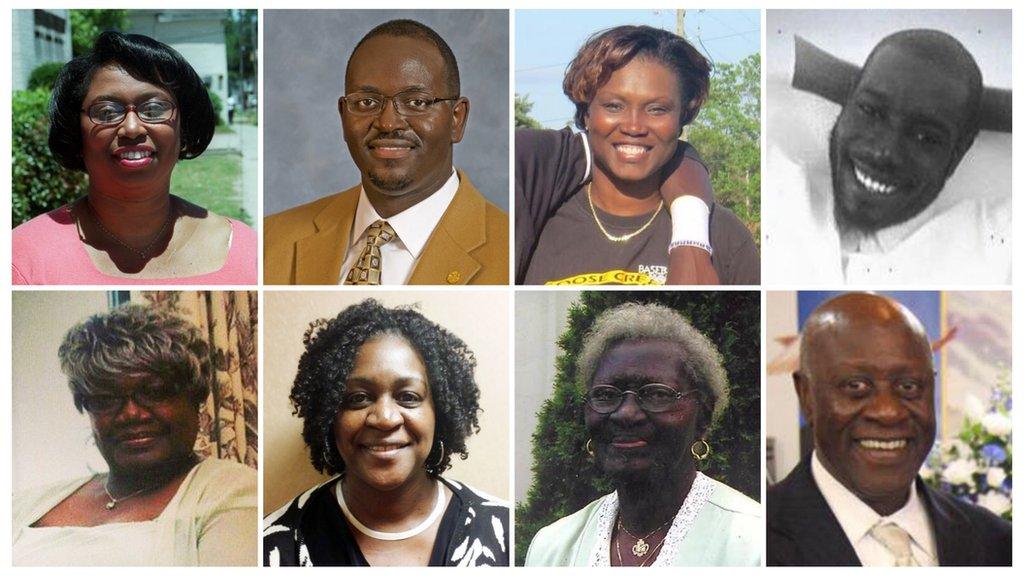Charleston shootings: Power of forgiveness in African-American church
- Published
"Everyone's plea for your soul is proof that they lived in love and their legacies will live in love. So hate won't win", a relative of one victim told the suspect
Journalist Adam Harris looks at the forgiveness shown in the Charleston courtroom and how it is a strength that has long been espoused in black American spirituality.
When relatives of those shot dead at the Emanuel African Methodist Episcopal Church in Charleston faced the suspected gunman, Dylann Roof, in a court hearing on Friday, they met him with words of forgiveness.
"I forgive you and my family forgives you," said a representative of Myra Thompson, 59, one of those killed on Wednesday night. "Repent and give your life to Christ and change your ways. You'll be better off than you are now."
Dr Eddie S Glaude, professor of religion and African American studies at Princeton University, says: "What we saw in court today was the best of the black tradition - that your evilness, your hatred will not distort the faith.
"There is a tendency to normalise black forgiveness and, in doing so, lose sight of what a miracle it is."
The African-American church has a deep history of forgiveness rooted in faith and tied into the history of white supremacy in the US.

Martin Luther King spoke of the importance of forgiveness
"It has long been recognised in the Christian community that we live in a social order that has been other than friendly," says Dr Alton Pollard III, dean of the Howard School of Divinity.
"Still [members of the black church] believe in the ethos of the founding figures. All persons are created equal in the sight of God."
'Less prone to hate'
That notion is what makes it easier to forgive.
"God is always greater and because of that, even in horrific conditions, we can still be faithful," says Dr Pollard.
"Because of faithfulness, we have the capacity to forgive."
The ability to forgive has emerged as both an act of mercy and a tool against oppression.
Martin Luther King, himself a reverend, famously said: "We must develop and maintain the capacity to forgive. He who is devoid of the power to forgive is devoid of the power to love.
"There is some good in the worst of us and some evil in the best of us.
"When we discover this, we are less prone to hate our enemies."

Services in Charleston have been full to overflowing since the shooting at Emanuel AME
As she stood in the courtroom addressing Mr Roof, Bethane Middleton-Brown, the sister of victim Rev Depayne Middleton-Doctor, said it simply.
"We have no room for hate so we have to forgive."
Dr Pollard echoed the sentiment. "Where there is no forgiveness there can be no love. The only thing more endemic to humanity than pain is the love of God.
"These families have forgiven but they have not forgotten. They still feel rage, they still hurt."

The victims

Clockwise from top left: Cynthia Hurd, Clementa Pinckney, Sharonda Coleman-Singleton, Tywanza Sanders, Ethel Lance, Depayne Middleton-Doctor, Susie Jackson, Daniel Simmons Sr
Cynthia Hurd, 54
Rev Clementa Pinckney, 41
Rev Sharonda Coleman-Singleton, 45
Tywanza Sanders, 26
Ethel Lance, 70
Rev Depayne Middleton-Doctor, 49
Susie Jackson, 87
Rev Daniel Simmons Sr, 74
Myra Thompson, 59
